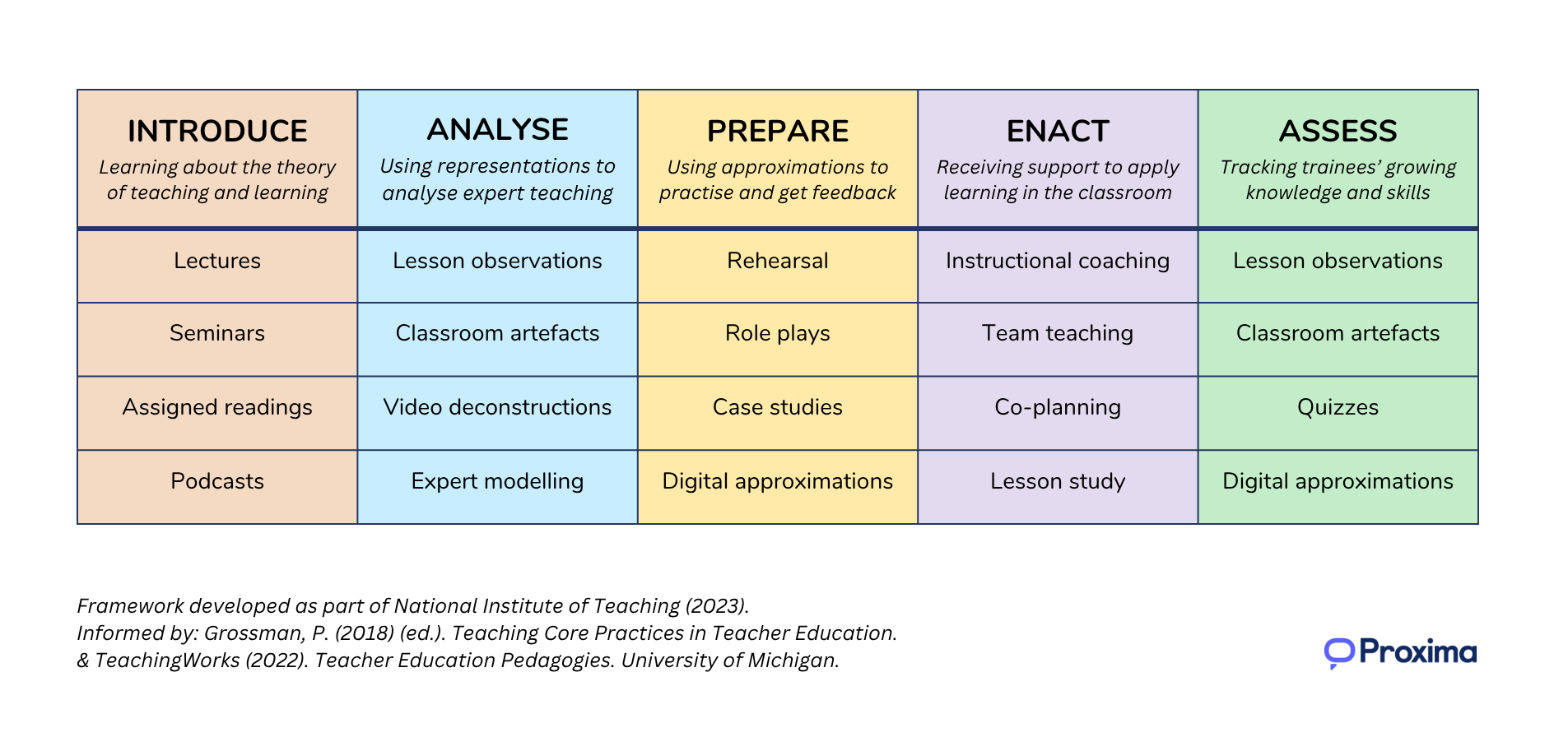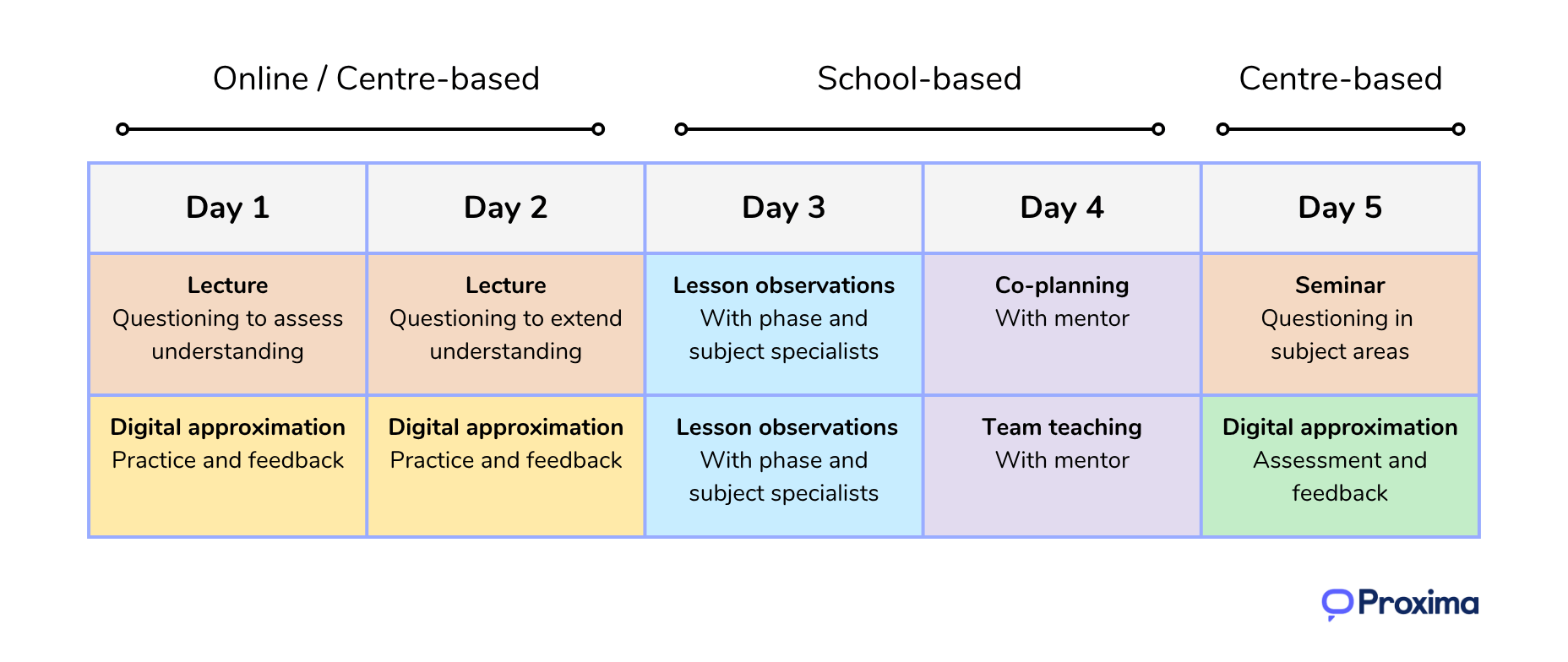Insights
A design and review framework for Intensive Training and Practice
Resources and research to help you plan and improve your ITaP provision.
Proxima works with school- and university-based teacher education providers in every part of England. As a result, we know that there is no single way to deliver intensive training and practice. However, we’ve seen many providers draw on a common body of evidence and ideas to inform their decision-making.
In this blog, we collect and share some of those insights.
A design framework for Intensive Training and Practice

This framework was developed as part of a research project funded by the National Institute of Teaching, which Proxima participated in. It was created to support providers consider the selection and sequencing of activities when designing ITaP units.
The framework can also be used as a review tool to help identify potential improvements once an ITaP unit has been delivered. For example, after running ITaP units this year, some providers we’ve spoken to are planning to use approximations to increase the amount of preparation trainees undertake for school-based ITaP elements or to increase the precision with which they can assess the trainees’ developing knowledge and skills.
Underpinning research
The central idea underpinning the framework is that new teachers will benefit from sets of activities that support them to develop the knowledge, skills and professional judgement needed to succeed in the classroom.
Recognising the complexity of teaching, academics such as Pam Grossman, Magdalene Lampert and Deborah Ball argued that these sets were likely to include different types of activities that each serve a different purpose. For example, they might include representations, which provide opportunities to deconstruct and analyse expert teaching, as well as approximations, which provide structured opportunities for practice and feedback.
As we’ve noted elsewhere, these ideas are not unique to ITaP, and clearly have applicability beyond it. However, designing or reviewing an ITaP unit can provide a focused opportunity to consider how a series of elements can be combined to support trainees to develop their practice more quickly or securely than might be achieved via other routes.
A worked example: using the framework to design an ITaP unit on Questioning

In this simple example, a balanced set of activities has been selected to help trainees develop a strong theoretical understanding of questioning and provide multiple, scaffolded opportunities to explore and apply those ideas.
The unit is sequenced to help trainees get the most out of school-based days, as without preparation – in this case via lectures and approximations – trainees are less likely to benefit from in-school activities like lesson observations and team teaching.
Attention has also been given to subject-specificity, with time set aside for trainees to consolidate what they have learned about applying particular questioning strategies in their subject areas through observations and work with their mentor.
Finally, using approximations again, trainees will be asked to craft questions for different purposes – e.g. to check for a misconception in their subject and to extend understanding – and to articulate why certain types of questions are better suited to particular tasks than others, before receiving feedback. This type of assessment will generate insights at the cohort level, as well as demonstrating the progress made by individuals.
Recent studies
Since this design framework was published as part of the National Institute of Teaching’s pilot study in 2023, a wealth of new research has been published exploring specific pedagogies within the framework, as well as issues related to sequencing and subject-specificity.
Research published so far in 2025 includes:
-
A team from Harvard University found significant, positive effects of approximations of practice on trainees’ questioning and discussion skills. The final study (paywalled) is available here; an earlier working paper (open access) is available here.
-
William Waychunas draws on survey and interview data to explore the benefits and challenges of practice-based pedagogies, including rehearsals and approximations. The study explores how these activities can supplement school-based elements by providing a safe space for practice. The paper is available here.
-
Focusing on maths and science, a team of researchers based in the USA explored how sequences of approximations can be used to scaffold learning, identifying positive outcomes related to trainees’ skills in managing a class discussion. The study (paywalled) is available here.
At Proxima, we’re also excited to be taking part in a new research project in 2025-26 and will be posting more updates soon!
If you enjoyed this post, sign up to our newsletter here.